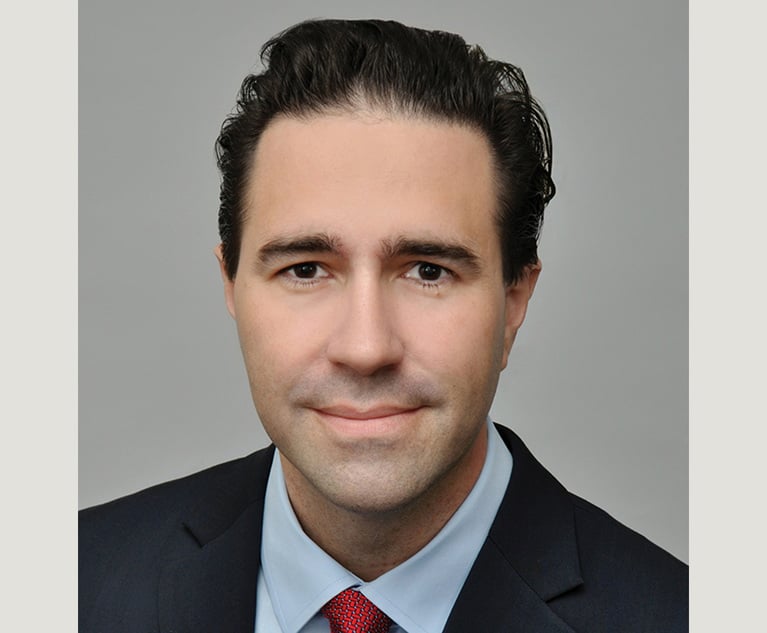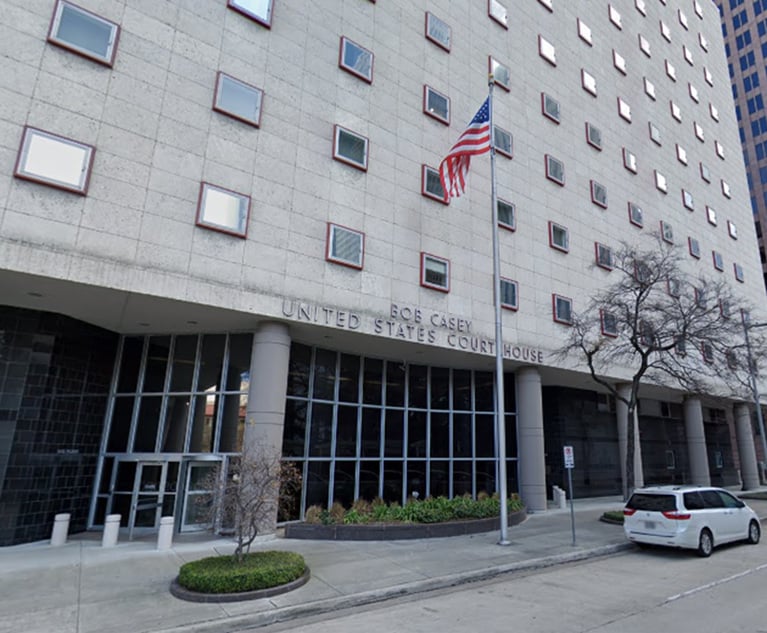IN PICTURES: 5 Years After Legalized Same-Sex Marriage, Family Law Shifts for Couples 'Not Immune to Divorce'
There are 1,138 legal protections that come with the institution of marriage. Five years ago, before same-sex marriage became legal nationwide,…
June 25, 2020 at 03:40 PM
5 minute read
Growing practice area
Giampolo said that in the past five years since the marriage equality ruling, she's observed many existing family law attorneys enter the LGBTQ market. "You'll see a lot of everyday family law firms advertising to the LGBTQ community," said Giampolo. "Letting the world know they are accepting and they will service their legal needs just like everyone else." Some family lawyers who are new to representing LGBTQ couples may face challenges if they don't know the unique, different aspects of LGBTQ family law, said Cathy Sakimura, deputy director of the National Center for Lesbian Rights in San Francisco, California. "It's great to see how the bar is opening up and letting go of past homophobia and transphobia, and representing people," Sakimura said. "But it's hard for people who are not connected to the community to understand those unique aspects." For example, there's a big question about how to treat pre-Obergefell common law marriage in Texas and other similar states, she said. Sakimura said that when the Supreme Court declares a law unconstitutional, it means the law has always been unconstitutional---it applies retroactively. But LGBTQ people have met resistance when they try to prove their common-law marriages existed before Obergefell, Sakimura said. "So far, every court has recognized that it applies retroactively," she said. "It's a big issue in Texas."
Presumed parent
Some of the biggest legal issues arise when LGBTQ spouses have children. Sakimura said every state has recognition that when a wife gives birth, her husband is presumed to be the father. But some states have mounted resistance to extending that presumption to LGBTQ parents, said Sakimura. The parentage issue is the biggest one in the LGBTQ family law practice of Meghan Freed, managing partner in Freed Marcroft in Hartford, Connecticut. "That can vary very much from state-to-state, even with a fully recognized legal marriage," Freed said. "Right now, in Connecticut, same-sex parents get the same marital presumption: That children are of the marriage, if they are born in the marriage. But the presumption is rebuttable. Even in Connecticut, we want to see an adoption. … It's even more important in the event of any move from state to state." Same-sex marriage has been legal in Connecticut since 2008. But before the Obergefell ruling, LGBTQ couples married there could not move to another state and have their marriages recognized. They couldn't get divorced if they moved to another state. "Obergefell, in terms of its impact on family law, one of the main things it did was help give people confidence about the portability of their marriages," Freed said. One dispute in litigation since Obergefell centers around the length of a marriage and its impact on asset distribution. Freed noted that an LGBTQ couple may have been in a relationship for decades, but married only five years ago. When getting divorced, the court only considers the married years when deciding who gets what. "It's a five year marriage, but it's a 25-year partnership," she noted. "It's an issue out there, which is what leads many same-sex couples to use alternative dispute resolution like mediation or collaborative law, to reach an agreement that honors their family structure rather than litigate it and find out." Giampolo, the Philadelphia LGBTQ law attorney, said the biggest difference in her family law practice post-Obergefell has been how many premarital agreements she needs to draft. It's because many LGBTQ couples get married when they are older. They've seen what marriage can do to people, and have a pragmatic view that marriage is like a contract, Giampolo said. Premarital agreements allow them to map out how those assets will be shared or separated, she said. "We've been watching straight people mess it up for 300 years. We are not immune to divorce," Giampolo explained. "Due to the fact we were just given this right five years ago, the people getting married tend to be older, and they tend to have assets."
Related stories:
Lawyers Note Skepticism, Open-Mindedness of Justices After Arguments
Same-Sex Marriage Wins in Historic Supreme Court Ruling
Marriage Ruling Historic, But Not Final Word on Gay Rights
This content has been archived. It is available through our partners, LexisNexis® and Bloomberg Law.
To view this content, please continue to their sites.
Not a Lexis Subscriber?
Subscribe Now
Not a Bloomberg Law Subscriber?
Subscribe Now
NOT FOR REPRINT
© 2025 ALM Global, LLC, All Rights Reserved. Request academic re-use from www.copyright.com. All other uses, submit a request to [email protected]. For more information visit Asset & Logo Licensing.
You Might Like
View All
Houston-Based Law Firm Overcomes Defamation Suit for Website Warning
3 minute read
Houston Law Firm Files $250K Breach of Contract Suit Against 2 Former Lawyers
3 minute read

Texas Bankruptcy Judge Withdraws Ethics Complaint Against Jackson Walker
2 minute readTrending Stories
- 1Public Notices/Calendars
- 2Wednesday Newspaper
- 3Decision of the Day: Qui Tam Relators Do Not Plausibly Claim Firm Avoided Tax Obligations Through Visa Applications, Circuit Finds
- 4Judicial Ethics Opinion 24-116
- 5Big Law Firms Sheppard Mullin, Morgan Lewis and Baker Botts Add Partners in Houston
Who Got The Work
J. Brugh Lower of Gibbons has entered an appearance for industrial equipment supplier Devco Corporation in a pending trademark infringement lawsuit. The suit, accusing the defendant of selling knock-off Graco products, was filed Dec. 18 in New Jersey District Court by Rivkin Radler on behalf of Graco Inc. and Graco Minnesota. The case, assigned to U.S. District Judge Zahid N. Quraishi, is 3:24-cv-11294, Graco Inc. et al v. Devco Corporation.
Who Got The Work
Rebecca Maller-Stein and Kent A. Yalowitz of Arnold & Porter Kaye Scholer have entered their appearances for Hanaco Venture Capital and its executives, Lior Prosor and David Frankel, in a pending securities lawsuit. The action, filed on Dec. 24 in New York Southern District Court by Zell, Aron & Co. on behalf of Goldeneye Advisors, accuses the defendants of negligently and fraudulently managing the plaintiff's $1 million investment. The case, assigned to U.S. District Judge Vernon S. Broderick, is 1:24-cv-09918, Goldeneye Advisors, LLC v. Hanaco Venture Capital, Ltd. et al.
Who Got The Work
Attorneys from A&O Shearman has stepped in as defense counsel for Toronto-Dominion Bank and other defendants in a pending securities class action. The suit, filed Dec. 11 in New York Southern District Court by Bleichmar Fonti & Auld, accuses the defendants of concealing the bank's 'pervasive' deficiencies in regards to its compliance with the Bank Secrecy Act and the quality of its anti-money laundering controls. The case, assigned to U.S. District Judge Arun Subramanian, is 1:24-cv-09445, Gonzalez v. The Toronto-Dominion Bank et al.
Who Got The Work
Crown Castle International, a Pennsylvania company providing shared communications infrastructure, has turned to Luke D. Wolf of Gordon Rees Scully Mansukhani to fend off a pending breach-of-contract lawsuit. The court action, filed Nov. 25 in Michigan Eastern District Court by Hooper Hathaway PC on behalf of The Town Residences LLC, accuses Crown Castle of failing to transfer approximately $30,000 in utility payments from T-Mobile in breach of a roof-top lease and assignment agreement. The case, assigned to U.S. District Judge Susan K. Declercq, is 2:24-cv-13131, The Town Residences LLC v. T-Mobile US, Inc. et al.
Who Got The Work
Wilfred P. Coronato and Daniel M. Schwartz of McCarter & English have stepped in as defense counsel to Electrolux Home Products Inc. in a pending product liability lawsuit. The court action, filed Nov. 26 in New York Eastern District Court by Poulos Lopiccolo PC and Nagel Rice LLP on behalf of David Stern, alleges that the defendant's refrigerators’ drawers and shelving repeatedly break and fall apart within months after purchase. The case, assigned to U.S. District Judge Joan M. Azrack, is 2:24-cv-08204, Stern v. Electrolux Home Products, Inc.
Featured Firms
Law Offices of Gary Martin Hays & Associates, P.C.
(470) 294-1674
Law Offices of Mark E. Salomone
(857) 444-6468
Smith & Hassler
(713) 739-1250






